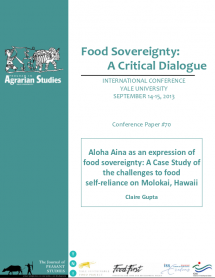Aloha Aina as an expression of food sovereignty A Case Study of the challenges to food self-reliance on Molokai, Hawaii

Authors
This paper explores the concept of food sovereignty on the island of Molokai where the Hawaiian value of aloha aina, or love for the land, guides local efforts to preserve and promote food self-reliance. In the paper, I discuss the nature and origins of the uniquely Hawaiian food sovereignty efforts on Molokai as well as the challenges they face. In this paper, I present two key arguments.
First, I explain how despite a history of distrust of and organizing against the state in the name of aloha aina, self-reliance in food on Molokai today requires greater collaboration with, as opposed to isolationism from, the central state. I also show how the conflicting paradigms for “sustainable” agriculture that exist within the Molokai community have precluded the formation of a unified food sovereignty movement.
While Via Campesina’s definition of sustainability is relatively specific (1996), in practice, the term “agricultural sustainability,” now ubiquitously used, has come to hold varying meanings for different people. For a community like Molokai, this then complicates what is meant by the rights of peoples to define their own food and agricultural system—the common definition of food sovereignty (Nyeleni 2007).
The competing visions of the policies and practices that define a sustainable food and agricultural system on Molokai provide insight for social movements elsewhere that are struggling internally to deconstruct and define what “agricultural sustainability” really means. Drawing on two key examples—marine resource management and controversy over the GMO seed industry presence—the case of Molokai highlights the inherent challenges to realizing food sovereignty in the state of Hawaii and beyond.
Clare Gupta, National Science Foundation SEES (Science, Education and Engneering for Sustainability) postdoctoral fellow, Yale School of Forestry and Environmental Studies Clare Gupta’s recently completed dissertation work in the University of California Berkeley’s Department of Environmental Science, Policy and Management examined the implications of wildlife conservation for the livelihoods of rural communities living near protected areas in northern Botswana. This work drew from the fields of human geography and conservation biology to assess migration patterns, agrarian change and community-based conservation around Chobe National Park. She is now conducting an interdisciplinary research project that examines sustainability initiatives to “re-localize” the Hawaiian economy, particularly in the agricultural and energy sectors, from a combined political and industrial ecological approach. Her recent publications include: “Elephants, safety nets and agrarian culture: understanding human-wildlife conflict and rural livelihoods around Chobe National Park, Botswana” Journal of Political Ecology (2013) and “Highlighting the shortcomings of CBNRM: The case of the Chobe Enclave” in Environmental Governance for Social Justice in Southern Africa (2013).
Food Sovereignty: a critical dialogue, 14 - 15 September, New Haven.